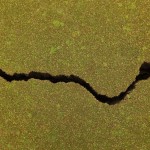Another Earthquake Strikes Johnson County

hoto by Cameron Spencer/Getty Images
Scientists have drawn definitive links between hydraulic fracturing disposal wells and induced earthquakes. The photo above shows a crack in a road after a natural earthquake in 2011 in Christchurch, New Zealand.
They’re small, and so far mostly just a nuisance, but one thing is clear: there are more of them, and their intensity may be increasing.
Another earthquake hit Johnson county last night, measuring 2.7. That makes nine quakes since the string of tremors began June 5, by our count. So how does that stack up to previous tremor activity in the area?
Fortunately, the data is readily available. Using the US Geological Survey’s Earthquake Database (and with plenty of help from a friendly scientist at the USGS), we pulled up all of the quakes in the area, going back to the eighties.
Here’s what we found: Since 2008, there have been thirty earthquakes in the area measured by the USGS. Before 2008? Zero. What else hadn’t been in the area until a few years before that time?* Deep injection wells, used to dispose of wastewater from hydraulic fracturing, or “fracking.”
After a string of small quakes in 2008 and 2009, scientists at Southern Methodist University (SMU) and the University of Texas at Austin (UT) looked at possible links between those wells and the earthquakes. They specifically looked at two injection wells in the area that were built in 2008. Seven weeks later, the nearby quakes started. “Were the DFW earthquakes natural or triggered by activities associated with natural gas production, most likely saltwater injection to dispose of brines?” the report asks. And the answer was yes, the “correlations are consistent with an induced or triggered source.”
None of those quakes in 2008-2009 went above 3.0 on the Richter scale. Since July 2011, there have been four quakes in the area measuring above that level.
The biggest quake ever recorded in Texas was 4.6 on the Richter scale, near Snyder, in 1978. And guess what that quake was linked to? That’s right, a series of injection wells in the Cogdell oil field. That quake “broke several windows and caused mirrors and pictures to fall of walls,” according to the UT/SMU report. But there are also plenty of injection wells in the state that haven’t produced any notable quakes, the scientists note.
None of the quakes in the Dallas-Fort Worth area have gone above 4.0 on the Richter scale, which is typically the level seismologists look at for damage. But the quakes in Johnson County seem to be getting closer to that mark. The largest quake recorded thus far was 3.6, on June 24.
Further Reading: More on the Science Linking Fracking Disposal Wells to Earthquakes
*Edited to add “until a few years.” The Railroad Commission of Texas, which oversees oil and gas drilling and injection wells in the state, wrote to us noting that “The first injection well in Johnson County was permitted by the Railroad Commission Sept. 11, 2003, and this well was one of 29 injection wells permitted for Johnson County by the Commission between Sept. 11, 2003 and Jan. 1, 2008 some injecting at depths as deep as 13,000 feet, similar to the deepest bottom interval depths for wells permitted since 2008 to today.”
We’ve asked the Commission for more information on the location of those wells, as well as the dates they began injection, and will add more once we hear back.
It can take months and even years for the pressure buildup of fluids in disposal wells to begin affecting fault lines, according to a report by NPR science correspondent Christopher Joyce. He writes that “the water first used in fracturing rock is retrieved and pumped into these waste wells, which take in lots of water. And at more than 9,000 feet deep, the water is under high pressure that can build up over months or years. It’s this pressure that can actually create earthquakes.” You can read more from his report on the links between injection wells and induced earthquakes here, and our explainer on the subject here.



